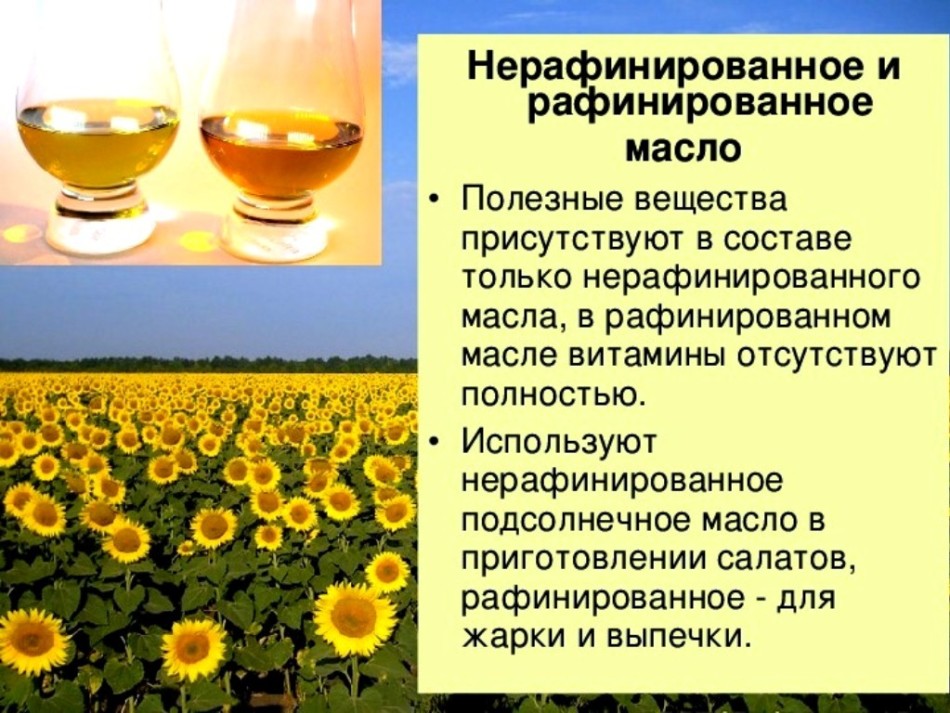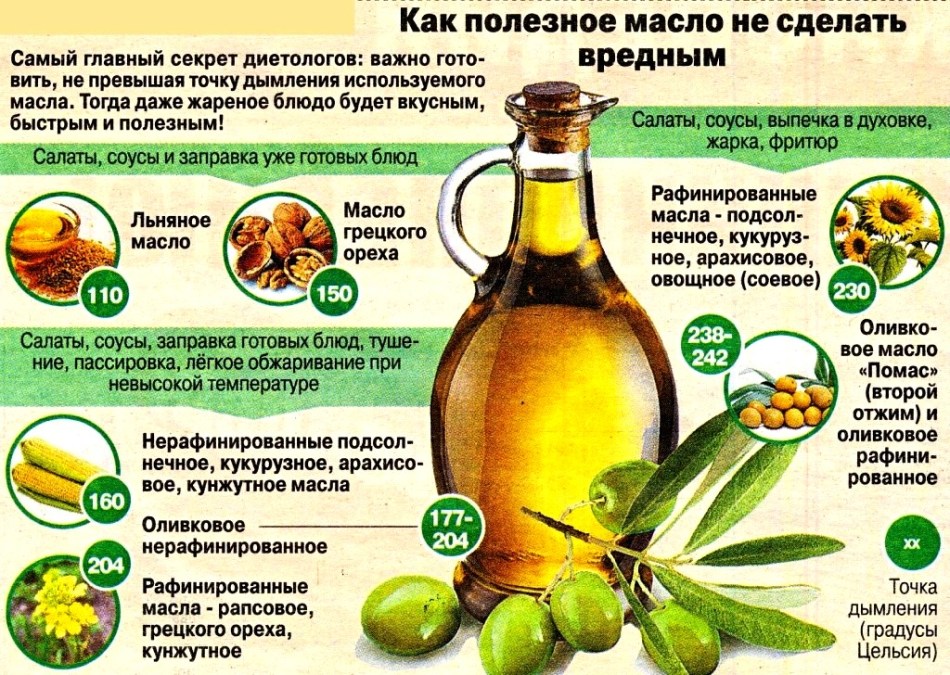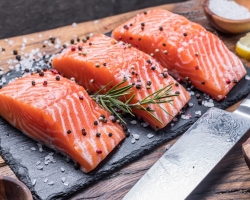From this article you will find out if there is a difference between refined and unrefined vegetable oil
Content
- What is the difference between refined vegetable oil from unrefined?
- How to make unrefined vegetable oil?
- What is useful to unrefined vegetable oil?
- Disadvantages of unrefined vegetable oil
- How to make refined vegetable oil?
- What is harmful to refined vegetable oil?
- How to use refined and unrefined vegetable oil so as not to harm your body?
- Video: You need to know this! About the dangers of refined oil
In Soviet times, we used the same type of oil - unrefined. It was fried, added to salads. Refined vegetable oil appeared in the 90s, after the collapse of the Soviet Union. What is the difference between refined vegetable oil from unrefined? Which is more useful? How do both types of oils make? We find out in this article.
What is the difference between refined vegetable oil from unrefined?
Both types of vegetable oil are made from the same products. The raw materials for vegetable oil can be:
- Sunflower seeds
- Fresh olives
- Corn grains
- Pumpkin seeds
- Flax family
- Sesame seeds
- Almonds and other nuts
- Mustard seeds
The difference between refined and unrefined vegetable oils consists only in the production method.

How to make unrefined vegetable oil?
How to make unrefined vegetable oil? Unrefined vegetable oil is obtained on an oil lamp, filling the seeds into the car with powerful presses that squeeze out the oil from them. This process is called cold squeeze. The temperature with cold spin does not exceed 43 degrees Celsius.
Then the resulting oil is slightly cleaned by upholding from impurities, and elements that affect transparency.

What is useful to unrefined vegetable oil?
For example, take sunflower oil. In unrefined sunflower oil there is:
- Vitamin A, E, D
- Saturated fatty acids (arahin, culul, stearin, palmitin)
- Mononasized fatty acid - oleic
- Polyunsaturated fatty acid - linolenic
- Acids: omega-3 and 6
- Chlorophyll
- Beta Sithosterol
- Lecithin
- Phosphorus

Unrefined vegetable oil helps:
- In prevention from blood clots and atherosclerosis
- Improve the condition of the skin, hair, nails
- It is better for weak children to grow
- Cut the nerves
- Men and women if they want to conceive a child
- Rejuvenating effects from oil masks
- Increase immunity
- Normalize metabolism in the body
- Improve the work of the stomach and intestines
- Bring hormonal background to normal
All beneficial properties in unrefined oil are preserved if it is fresh (not frying on it), in moderate quantities.
Disadvantages of unrefined vegetable oil
What the benefits of unrefined oil we have already figured out, but he has and limitations:
- Unrefined vegetable oil sensitive to light, and quickly burns, therefore it can be stored no more than 1 year
- If you fry it, it smokes
- Not for all dishes is suitable because it has a strong smell

How to make refined vegetable oil?
Since it is impossible to completely squeeze out completely oils of seeds with cold spin, but only 35%, they came up with a whole range of work to get the remaining oil. This process is called - the production of refined vegetable oil.
The first stage is the extraction method. This is the heating of the stumps from seeds with the addition of a chemical solvent - hexane to them (for greater return). This chemical substance isolated from gasoline does not dissolve in water, boils at 67̊c.
The second stage of oil is refined or cleaned. At this stage, an unequal solvent is removed from the resulting oil, and it is cleaned of useful natural components, which give the clock, smell, turbidity, bitterness. Work on oil purification is the following subspecies:
- Hydration - The oil is mixed with hot water. As a result, the oil rises up, and the hexane and useful natural phospholipids, the proteins from the seeds fall to the bottom. Then the oil is filtered, and after such processing oil is called "hydrated."
- So that on a bottle with butter it is written "Neutralized", held the process of neutralization In separators with a temperature of about 100̊c. The oil is poured here with the alkali. So the remains of gasoline and healthy fatty acids are released from it. Waste from oil is then transferred to soap production.
- Then the oil passes bleaching - cleansing of solvent and natural pigments that are responsible for the color of the oil. This process takes place in a vacuum installation with a temperature of 110̊c. Oil is placed in it along with activated coal or special clay. Then the oil is filtered.
- Freezing. Keselgur is added to the oil-small particles in the form of sand from diatomic algae, and are kept in the cold with a temperature of about 5-8̊c. So wax is released from the oil to extend its storage. And on the label with butter you will read that it "Hard".
- "Deoded" will be oil if it has passed deodorage - Exposure to steam with a high temperature of about 260̊c. After this process, aromatic substances and all useful from it are completely removed.
When refined from the oil, they are removed:
- Pleasant aroma
- Phospholipids - they precipitate, and then burning in a pan when heated
- Pigments (therefore, refined oil has almost no color)
- Wax - it gives clouding of oil
- Useful fatty acids
After extraction and refinement in vegetable oil from nutrients, little remains. Part of the oil (up to 25%) is deformed, and moving into trans fats (transisomers of fatty acids), which are not digested in the body, but accumulate, and turn into toxins.

What is harmful to refined vegetable oil?
In the purification of vegetable oil during refinition, they participate:
- Phosphates
- Silicates
- Some poisons
- Gasoline (hexan)
What is harmful to refined vegetable oil?
- Part of the above chemicals remain in oil, and we eat them every day, and they are carcinogens, and cause malignant tumors.
- At high temperatures (from 150̊C), chemical reactions occur in the oil with the formation of toxins, and if you again fry it, then there are even more.

How to use refined and unrefined vegetable oil so as not to harm your body?
In order not to harm the body different types of vegetable oil, it is advisable to use as follows:
- In refined oil, you can extinguish vegetables, fish with the addition of water, so the oil temperature will not rise more than 100 degrees Celsius.
- Unrefined vegetable oil is rich in vitamins and healthy fatty acids, so it must be added to salads.
- In unrefined oil, cold presses can be frying, since it has not yet been heated, unlike refined, and carcinogens are not formed in it (you can’t fry the second time).
- On high -quality unrefined oils (sunflower, olive, coconut, from grape seeds) you can fry several times.

So, we learned what a big difference between refined and unrefined vegetable oil.
Video: You need to know this! About the dangers of refined oil
We advise you to read:







